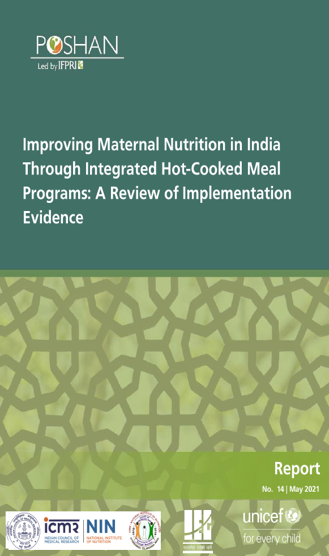Improving maternal nutrition in India through the hot cooked meal programme: A review of implementation evidence

Background and objectives:
A notable approach to addressing maternal undernutrition during pregnancy in India in recent years has been the integration of hot-cooked meals (HCM) for pregnant and lactating women together with the provision of other health/nutrition services. Called the One Full Meal (OFM) program, these efforts aim to improve maternal nutrition and health across India by bundling centre based HCM with other nutrition services and behaviour change communication implemented through the Integrated Child Development Services (ICDS) scheme. The program is offered at anganwadi centres (AWCs) and has been implemented in eight states in India, including Andhra Pradesh, Chhattisgarh, Gujarat, Karnataka, Maharashtra, Telangana, Madhya Pradesh, and Uttar Pradesh. Although the OFM program has been implemented since 2013, there is limited consolidated insight on its effectiveness or on broader lessons for implementation. The objectives of this evidence review of the OFM program are, therefore, to (1) compare the different state OFM program models on their objectives, implementation elements, cost norms and monitoring mechanisms; (2) develop program impact pathways on the potential ways in which the program could influence intended outcomes; and (3) examine the availability of evidence underpinning the program’s intended pathways to impact.
Methodology:
We used a combination of approaches to bring together evidence and implementation insights on the OFM program—a desk review of available program documentation, the development of program impact pathways, an evidence review and a stakeholder consultation. First, a desk review was conducted to understand the design, implementation, and evidence on the OFM program. We examined the program objectives and its elements, duration, implementation scale, and the cost norms across the eight states mentioned above. A range of resources including government orders, government reports, state reports, and findings from any studies or assessments conducted relating to OFM were used and relevant information was summarized for each state. Second, a program impact pathway (PIP) was developed to identify and represent the multiple potential pathways through which the OFM program might have an impact on various intended outcomes. Third, we examined available evidence pertaining to the assumptions in the pathways to impact. Finally, a webinar was convened on March 31, 2020 to review the impact pathways and the evidence gaps on the OFM program and build consensus for developing a research agenda. This report summarizes insights from these efforts.
Findings:
The stated objectives of the OFM program are broad and vary across states. In some states the objectives pertain to achieving proximal outcomes such as improving coverage of services and practices such as maternal dietary adequacy and improving birth weight. In other states, objectives pertain to improving distal outcomes such as mortality rates. There were similarities and consistencies in the program models adopted by most states. For instance, the OFM program model typically consists of a mid-day meal for women at the AWC, administration of iron and folic acid (IFA) and calcium, deworming, monitoring of gestational weight gain, monitoring of infant height and weight measurements, and health and nutrition counselling. The HCM itself aimed to provide about 40 percent of recommended dietary allowance (RDA) as per the National Food Security Act (NFSA), with per meal costs ranging from Indian rupees (INR) 8.75 to INR 24.00. Most states noted spending closer to INR 24.00 per meal. Chhattisgarh and Gujarat are the only states which continue to provide Take-Home Ration (THR) alongside OFM. The two main approaches to scaling up the program were observed: some states conducted a pilot and adopted a gradual scale-up model, while others rolled out the scheme to eligible beneficiaries immediately. Using the available program documentation, a schematic representation of potential pathways to impact was developed. We outline three primary pathways that together encompass the multiple components of the OFM program: the food pathway, the health and nutrition services pathway, and the group-based behavior change pathway. The evidence review found limited available research on the OFM program, unfortunately. Of the four studies that were found (three implementation research studies and one evaluation study), two implementation research studies used mixed methods while one used only qualitative methods. The scale of the studies varied, ranging from two blocks to a few districts. The studies focused primarily on implementation issues and no impact evaluations were available to assess the extent of the program’s impact on maternal nutrition outcomes or on birth weight. From the stakeholder consultations at the webinar, additional insights emerged on expansion in the focus of the OFM program over time, client-level challenges with time availability and commuting to AWCs for meals, client preferences for THR in place of HCM at an advanced stage of pregnancy, importance of peer support, mobility, and information. Participants noted the limited availability of evidence and called for additional careful research on program implementation and impact.
Recommendations and conclusions:
From the implementation and evidence review, and the webinar discussions, it is apparent that the OFM program model has potential to be used as an effective platform for delivering a combination of services to pregnant women, which are essential both for fetal growth and the maternal health. The review identified key areas for program improvement, specifically around addressing known challenges around the food pathway, and investing in further strengthening the nutrition behavior change and health services pathways. Evaluations of the impact of the OFM model on coverage, nutrition behaviors, diets and biological outcomes are limited and further investments in evidence-building can help sustain investments in these programs. The review and consultation both underscored the need to invest in further implementation research on the OFM program to systematically study various program aspects to identify areas that need further strengthening, and to assess the impact of further program refinements. Together, these would help to further understand and address program implementation challenges in diverse contexts and generate evidence on the multiple pathways to impact of the OFM program. Closing evidence gaps can enable program implementers and policymakers to understand the program’s benefits and effectiveness in ways that help ensure sustainability of investments in such program models.


